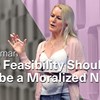voices

Should Scholars Own Data? David Grusky About the American Voices Project
If qualitative work were to be rebuilt around open science principles of transparency and reproducibility, what types of institutional reforms are needed? It’s not enough to mimic open science movemen
On algorithmic mediations
European Journal of Social Theory Abstract In this article, the main focus will be to analyze the notion of mediation in an attempt to apply it to one of the major topics of our time: the increasing imp

Equality and equity in Swedish education: policy, practice and historical perspectives
Björn Åstrand, Universitetslektor vid Institutionen för idé- och samhällsstudier vid Umeå universitet. Equality and equity in education is since long a key policy priority internationally as well as in
Geoffrey Brennan: On exchange and its gains
Geoffrey Brennan is an Australian philosopher. He is a professor of philosophy at the University of North Carolina at Chapel Hill and a professor of political science at Duke University. This seminar was su
David Grusky: Should scholars own data? The high cost of neoliberal qualitative scholarship
Welcome to this seminar with David Grusky, Professor of Sociology at Stanford University.The seminar is jointly organized by the Institute for Analytical Sociology and the Institute for Futures Studies.D Thursday, October 6 13:00-15:00 (CET) At the Institute for Futures Studies (Holländargatan 13, Stockholm), or onlineIf qualitative work were to be rebuilt around open science principles of transparency and reproducibility, what types of institutional reforms are needed? It’s not enough to mimic open science movements within the quantitative field by focusing on problems of data archiving and reanalysis. The more fundamental problem is a legal-institutional one: The field has cut off the development of transparent, reproducible, and cumulative qualitative research by betting on a legal-institutional model in which qualitative scholars are incentivized to collect data by giving them ownership rights over them. This neoliberal model of privatized qualitative research has cut off the development of public-use data sets of the sort that have long been available for quantitative data. If a public-use form of qualitative research were supported, it would not only make qualitative research more open (i.e., transparent, reproducible, cumulative) but would also expand its reach by supporting new uses. The American Voices Project – the first nationally-representative open qualitative data set in the US – is a radical test of this hypothesis. It is currently being used to validate (or challenge!) some of the most famous findings coming out of conventional “closed” qualitative research, to serve as an “early warning system” to detect new crises and developments in the U.S., to build new approaches to taking on poverty, the racial wealth gap, and other inequities, and to monitor public opinion in ways far more revealing than conventional forced-choice surveys. The purpose of this talk is to discuss the promise – and pitfalls – of this new open-science form of qualitative research as well as opportunities to institutionalize it across the world.
Eva Erman: Why feasibility need not and should not be a moralized notion
Venue: Institute for Futures Studies, Holländargatan 13 in Stockholm, or online. Research seminar with Eva Erman, Professor of Political Science at Stockholm University. Her research focuses on democrat

Eva Erman: Why Feasibility Need Not and Should Not be a Moralized Notion
Research seminar with Eva Erman, Professor of Political Science at Stockholm University. Her research focuses on democratic theory, specifically on questions of democracy beyond the state, in a global
Simone Abram: Caring and sharing: Democratic imaginaries in question
Dr Simone Abram, Department of Anthropology, Durham University ABSTRACT Within the broad term 'democratic state' there is a messy set of imagined virtues, vices and possibilities. In this paper, I consi
Björn Åstrand: Equality and equity in Swedish education: policy, practice and historical perspectives
Björn Åstrand, Associate professor at Department of Historical, Philosophical and Religious Studies at Umeå University AbstractEquality and equity in education is since long a key policy priority intern
Qué futuro tiene el futuro? El País reports on our AI research
"We live in an unpredictable time, the leading experts in artifical intelligence tell us. They have no answers and ordinary citizens are not even capable of asking the pertinent questions. We traveled








